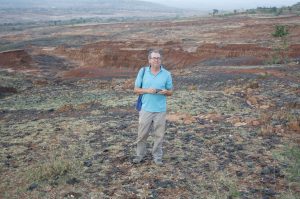Augusto Oyuela-Caycedo, Ph.D.
Associate Professor
After growing up in northern Colombia’s lowlands, Augusto Oyuela-Caycedo obtained a Bachelor’s Degree in Anthropology at the Universidad de Los Andes in Bogotá, Colombia. He started his career doing archaeology with the Fundación Banco de la República. With this institution’s s financial support, he researched the origins of the theocratic archaeological Tairona culture, which later developed into the ethnic group known today as Kogui or Kabagga. His research from very early on looks at these groups’ relationship to the environment and proposes that the forest today is an archaeological artifact of indigenous groups groups human actions in the Sierra Nevada de Santa Marta. At that time, he began research at San Jacinto, Department of Bolívar. He developed the basis for community research that eventually created the first communal museum in Colombia with the community’s collaboration and assistance from Dr. Renèe M. Bonzani (University of Kentucky). Augusto later developed his dissertation on pottery origins in the Americas, which date back to 6,000 BC. He completed his Ph.D. in Anthropology at the University of Pittsburgh. He also obtained a University Postdoctoral Fellowship for two years at the University of Calgary, Canada, where he worked with Professor Scott Raymond in the Department of Archaeology.
His first academic job was when he won an international competition, ¨Generación 125 Años¨ to attract Colombian professors living overseas back to Colombia with a program created by the Congress of the Republic of Colombia for the National University (Universidad Nacional de Colombia). He was initially appointed as a tenure-track Assistant Professor, and a year later was promoted to Associate Professor at the Universidad Nacional de Colombia. Professor Oyuela-Caycedo chose to develop ethnographic and archaeological research in Amazonia, using Imani’s created research center in the Colombian Amazon in the capital city of Leticia. For three years, Professor Oyuela-Caycedo worked on the social organization and fishing technology of the Tikuna indigenous groups, worked with the Yukuna indigenous groups on the Caqueta River, and conducted an archaeological survey along the remote regions of the Mesay River. After the political and social instability of Colombia at the time and with the impossibility of doing further fieldwork, Professor Oyuela-Caycedo returned to the United States, where he taught at Eckerd College in St. Petersburg, Florida, and the University of Kentucky in Lexington. Professor Oyuela-Caycedo was then appointed by the University of Florida as an Assistant Professor in 2004. Later, in 2011, he was promoted to Associate Professor in Anthropology.
In his time at the University of Florida, he has expanded his research into Peru, excavating the site of Quistococha, near Iquitos. He works with funding from the Tropical Conservation and Development (TCD) programs on human capacity building projects in the Peruvian Amazon. Later, he developed an interest in archival research on the history of science and worked with in collaboration with Dr. Manuela Fischer, curator of the Staatliche Museen zu Berlin, Stiftung Preußischer Kulturbesitz (Germany), on issues that have significantly impacted Amazonian and Andean scholarship.
He obtained a sabbatical year, exploring historical ecology, religion, and sustainable development in Southeast Asia, and for comparative purposes, he traveled to Thailand, Laos, and Cambodia. He also works in Ethiopia on a research problem of early human rock shelter modification at Mochena Borago, a project directed by Steve Brand; they took undergraduate students to the field and conducted archaeological research at this site. He also continues exploring issues on the social life of plants by visiting the coffee production areas in Ethiopia (Kaffa and Jima), Ecuador (Galapagos), and Colombia (highlands).
Recently, he developed a research project on early Valdivian human-environmental actions at the floodplain site of Julcuy in Manabi, Ecuador, in collaboration with Professor Florencio Delgado of Universidad de San Francisco in Quito, as well as collaborating on a research project in the Galapagos Islands. In the summer before the pandemic, he began a new project on the monumental structure of Tumshicayo, at the Callejon de Huailas, Peru, dealing with the issues of catastrophes, environment, and religion that has been part of his long term scholarly agenda in historical ecology. Professor Oyuela-Caycedo has graduated several Ph.D. students who have worked with indigenous peoples and archaeology in Brazil, Ecuador, Peru, and in the United States. He has also been a committee member on several dissertations that range in topics from literature, geography, and history to issues dealing with tropical conservation to permaculture, urban archaeology, and historical archaeology.
Professor Oyuela-Caycedo has published four books and more than 100 articles in Spanish, German, and English and continues to work on books related to the history of science and historical ecology.
Areas of Interest/Research
The primary approach is Historical ecology and the History of Science. The central teams are: Catastrophe, Evolution of ideology, the ecology of religion, indigenous peoples of South America (especially the Amazon and the Andes), origins of technology and food production, history and theory of Latin American archaeology and anthropology
Contact Information
Office: 1112 Turlington
Phone: (352) 294-7590
Email:caycedo@ufl.edu
Mailing Address:
Department of Anthropology
University of Florida
P.O. Box 117305
Gainesville, FL 32611-7305